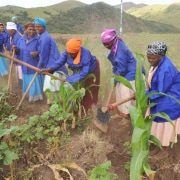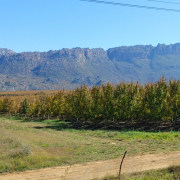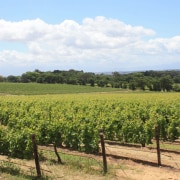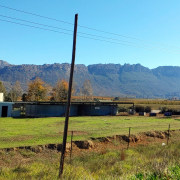|
Getting your Trinity Audio player ready...
|
The continued failure to address land rights in South Africa and the devastating impact of corruption came under the spotlight on 23 October 2023 at a Corruption Watch (CW) event. The organisation hosted a listening session of its new podcast series titled Land and Corruption: Story of the Marginalised, and simultaneously released a research report addressing the intersection between land, corruption, and discrimination.
The series and report are based on CW’s participation in Transparency International’s long-running Land and Corruption in Africa project, which seeks to address land corruption risks and injustices in sub-Saharan Africa.
Currently involved in the second phase of the project, CW’s work in this regard focuses on the plight of people who live and/or work in farming communities, specifically in the Western Cape. The case study included in the report focuses on equity schemes, a policy programme that was rolled out by the Department of Land Reform and Rural Development from the late 1990s until the 2010s.
The research report bases its findings on interviews with a range of experts who highlight the weak implementation of land reform programmes, the fragmented legal framework that creates obstacles for those whose rights have been violated, and perceptions of pervasive corruption in the sector. CW also spoke to many communities in the Western Cape, to learn the on-the-ground situation.
The research builds on a 2019 CW report, Unearthing Corruption in the Land Sector, which illustrated the scale of the problem. Based on 706 submissions received in a six-year period between 2012 and 2018, that report found evidence of a wide variety of corrupt practices, including bribery of public officials, embezzlement, misuse of public procurement processes, and distortion of laws and policies by political elites to facilitate the capture of land by business for development purposes.
Podcast series
“Corruption Watch releases this South African section of the regional Land and Corruption in Africa report in conjunction with a podcast series in which we not only underscore the critical issues emanating from this research report but let the voices of the marginalised speak about their reality as they see it and live it,” says report co-author and CW senior researcher, Melusi Ncala, of the new report.
The most critical detail in the series is the fact that the Department of Agriculture, Land Reform and Rural Development, to the detriment of many beneficiaries, has covered up financial irregularities, human right violations and wrongdoing in Farm Worker Equity Schemes for the past decade, adds Ncala. “Based on a report reviewing Farm Worker Equity Schemes, referred to as the ZALO Capital Report, we expose the rot that officials have been seeking to hide while protecting private interests.”
The first episode of the five-part podcast series was launched on Wednesday 11 October, with subsequent episodes released each Wednesday until 8 November. Each podcast highlights a different aspect of the land question, and the gaps and failures in addressing the pervasive inequality in South Africa in relation to access to land.
Importantly, the series shares, in moving interviews and testimonies, the lived experiences of people who continue to suffer the consequences of the colonial legacy of land administration, the failure to implement land rights, and the impact of corruption and maladministration in the sector.
Ncala adds: “When we think of all these depressing occurrences, and if we are honest with ourselves, we would acknowledge that these ailments are indicative of the fact that while the political and economic elite devised creative solutions as a response to the land question, they were even more creative in their corruption schemes.”
The marginalised have not stood a chance pre-1994 and certainly not under the ANC’s three-decade rule which is marred by corrupt dealings, Ncala concludes.
Land not just an economic factor
Several respondents in the report point to the economic implications of the land question. However, it also highlights that for many in South Africa, land is not only an economic proposition, but also forms the basis for communal, cultural, and spiritual practice. Without secure tenure, people may risk losing their ability to access sites of religious importance.
Almost 30 years since the demise of apartheid, the persistent vast inequalities in South African society prevent individuals from exercising their land rights on an equal basis with others. Despite the state’s robust anti-discrimination framework, non-implementation remains a challenge, as well as difficulties for the law to penetrate some areas.
This report and podcast series makes evident the pressing need to address the challenges of land governance in South Africa, and to institute a concerted range of action. Reform processes to date have fallen short of producing the levels of transformation required to ensure equality, as envisioned in the Constitution. Further urgent reform is critical, along with demonstrated political will to change the trajectory of a country still struggling under the weight of its own history.
Access the podcast series on these platforms:
Apple Podcasts | Spotify | Google Podcasts
For media enquiries contact:
Oteng Makgotlwe
Cell: 076 473 8336 E-mail: OtengM@corruptionwatch.org.za








